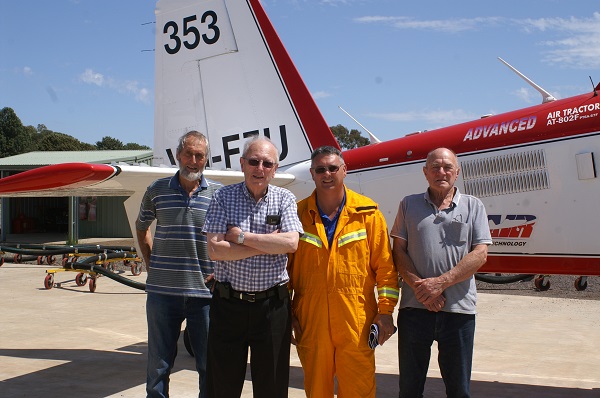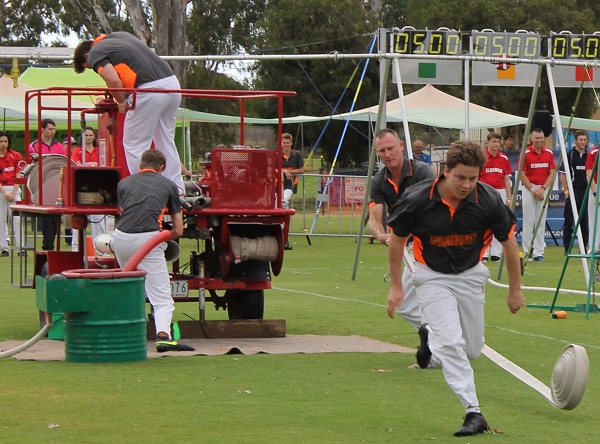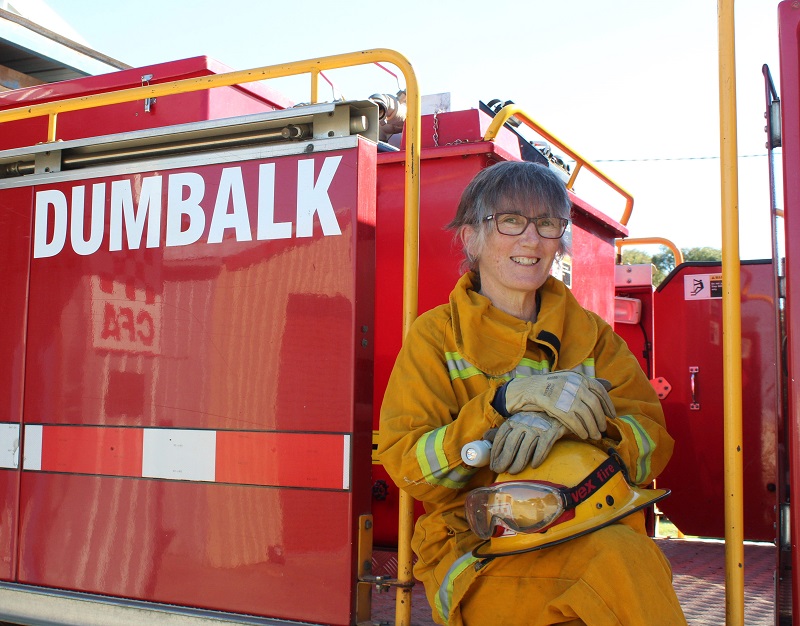
HomePage Featured (486)
VFBV Media Release - May 2021
Jack McGennisken was always a hero in the eyes of his daughter Judi Pymer, and now more than 60 years after his death, the Wonwondah volunteer firefighter is being formally honoured for his service and heroism.
After a campaign lasting almost 20 years, volunteer firefighters have ensured Mr McGennisken’s name will be added to the Victorian Emergency Services Memorial.
Volunteer Fire Brigades Victoria (VFBV) district 17 state councillor Maurice Dumesny said it was a fitting tribute for Mr McGennisken who was accidentally killed during a roadside burn-off on December 9, 1957.
To Mrs Pymer the recognition is something to cherish, to his fellow CFA volunteers it’s well-deserved recognition for a fallen colleague.
Mrs Pymer said being a volunteer was a big part of her father’s life.
“He was very involved with all the community. To me he was my hero, whether he was on the footy ground, driving the trotters or helping the fire brigade,” she said.
Mrs Pymer was adopted when she was four and a half and Mr McGennisken died when she was 10.
“I didn’t know him that long but I was always proud of him, whatever he did,” she said.
“The older I get, the more I recognise what Mum and Dad did for me.”
Some of her great memories of her father centre on his CFA volunteer work. “After the fires in the summer of 1956, I remember a couple of days later going out with him to check that all the stock lying around were actually dead.
“If he found any alive, he would have humanely put them down. He was a big man but a very gentle man…a gentle giant.”
Mrs Pymer said she was proud that his name was being added to the memorial.
“There was a thanksgiving service in Horsham in 2005 and because it was a burn-off, not a fire, they recognised him as being in service, not dying in the line of duty,” she said.
“Mum would be so proud that he has been recognised this way. He was only 43 when he died and Mum had to raise me while trying to hang on to the farm, which she did.”
The accident happened on the Henty Highway south of Horsham during a roadside burn in conjunction with the Country Roads Board (CRB), now known as VicRoads.
An empty fuel truck heading to Portland clipped a CRB patrol vehicle and overturned onto Mr McGennisken and a CRB worker, who also died later in hospital.
A campaign to formally recognise his contribution was started in the early 2000s by former Wonwondah brigade member Jim Heard who was at the scene when Mr McGennisken was killed.
“When Jim Heard was writing the history of the brigade, he started the campaign to have Jack’s name added to the memorial wall on behalf of the brigade,” Mr Dumesny said.
“At the time it was deemed by the CFA to be a road accident but we kept pushing for it and we’re honoured that he has been finally added,” he said.
A plaque in the Wonwondah Hall also recognises Mr McGennisken, who was captain of the brigade at the time of his death.
Born Phillip, Mr McGennisken was known as Jack from his middle name Jackman, and lived his life on his family sheep and cattle farm Girvan Lea.
The plaque is being prepared and will soon be added to the memorial. Mr McGennisken’s name will also be forwarded to the national memorial in Canberra.
The new memorial was completed last year and is a tribute to fallen members from CFA, Forest Fire Management Victoria, MFB, VICSES, Ambulance Victoria, Live Saving Victoria and Marine Search and Rescue.
VFBV CEO Adam Barnett said Mr McGennisken’s addition to the honour roll alongside 79 other CFA firefighters was an important tribute to his family, friends and loved ones and recognised those who have made the ultimate sacrifice in the line of duty on behalf of their communities.
“I thank the local community, brigades and VFBV District Council 17 who all assisted in the long advocacy for Jack to be recognised.”
“Mr McGennisken’s addition to the honour roll is a fitting tribute to a CFA firefighter who has selflessly given their lives to protect the lives of other Victorians.”
“CFA volunteers play a critical role in fire prevention across the state, and roadside burns like the one being undertaken by Mr McGennisken’s crew have no doubt saved countless lives as part of Victoria’s fire prevention works.”
“Mr McGennisken tragic sacrifice will forever be remembered, as we mark our respect and deep sorrow for each of the precious lives lost in service of their community.”
A memorial service on May 2 where Jack McGennisken was inducted to the honour roll also recognised the loss during the 2019-20 fire season of three Victorian firefighters from Forest Fire Management Victoria; Bill Slade, Mat Kavanagh and David Moresi, three New South Wales firefighters from the NSW Rural Fire Service; Geoffrey Keaton, Andrew O’Dwyer and Samuel McPaul and North American firefighters; Ian McBeth, Paul Hudson and Rick DeMorgan Jr.

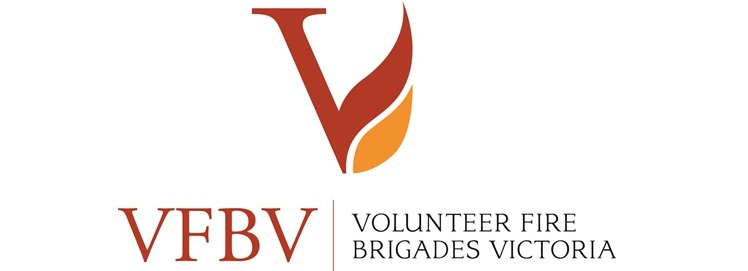 |
About VFBV: VFBV is established under the Country Fire Authority Act and is the peak body for CFA Volunteers in Victoria. VFBV works tirelessly to represent, advocate and support CFA volunteers to the CFA Board and management, governments, ministers, members of parliament, councils, instrumentalities, business and the public. Our vision is for Strong Volunteerism, Embraced to Build Community Resilience for a Safer Victoria. |
 |
This article is part of our National Volunteer Week Showcase - celebrating CFA Volunteers. |
Dumbalk volunteer still breaking down barriers after 40 years
Written by VFBVVFBV Media Release - May 2021
CFA volunteer and south Gippsland dairy farmer Janet Auchterlonie was the first woman to join her local brigade in the early 1980s and nearly four decades later she’s still trying to break down barriers.
The former Dumbalk fire brigade captain continues to contribute many hours to the brigade and the wider volunteer service, and is encouraging more young people to follow her footsteps.
However, it seems some have the wrong image about being a CFA volunteer and Janet wants to set them straight.
“People imagine it’s a very risky endeavour but it’s not,” she says. “I’ve been to so many fires over 40 years but I’ve never felt in danger. There’s the image of someone with a hose in front of 20-foot-high flames and that puts them off but the reality is very different. You can get in dangerous situations but our training and safety-first culture minimise that risk and statistically I’m more likely to be injured on my farm.”
Janet, who was earlier this year named South Gippsland Shire citizen of the year, plays a big part in ensuring the safety of volunteers. She is the brigade training coordinator, chair of the District Planning Committee training sub-committee, a volunteer representative on the joint CFA-Volunteer fire Brigades Victoria (VFBV) training committee, and chair of a committee to develop strike team leaders.
“There’s a lot more training now and it’s very inclusive,” she said.
As a regular strike team member, adding to the volunteer capacity in times of major fires, Mrs Auchterlonie sees the benefits of constant upskilling.
“We’re trying to build consistent standards and get the right people with the right skills to do those roles and make sure we maintain their skills maintenance when we go for a few years without a major incident” she said.
During the 2019-20 fires in NSW and East Gippsland, Janet went on seven deployments as crew leader, driver or strike team leader and was away for a total of 28 days. Her husband Rob is also a dedicated long-time volunteer and made a similar contribution. For the first time they were away together, leaving their son to run the farm.
Volunteering has advanced since her first days on the back of a truck alongside Rob during blackout work at Driffield, near Morwell, after a major fire in 1983.
“I was the first female member of the brigade but I felt that’s what you did in your district – you joined your local brigade. I never noticed too much that I was the only female, maybe because I mostly worked in traditionally-male professions.”
After moving to Dumbalk, Janet and Rob found a proactive, welcoming and progressive brigade. And says she felt welcomed and respected in the volunteer service.
“I was thinking of dropping out of CFA, but as soon as we walked through the door at Dumbalk, we were like old friends.”
She also found more opportunities. “The fact that I could become an officer and a captain for six years; that wouldn’t have happened 40 years ago,” she said. “I didn’t chase those roles – I had men encourage me to stand.”
Janet, 61, has stepped back from the captain’s role but remains one of the brigade’s most frequent responders and is dedicated to training younger members both locally and further afield.
“We’re maintaining the status quo with numbers but the average age is getting older,” she said. “Most of our members are out of town so it would be good to get some new people involved, especially young people.
“You get so much personal development out of it. I’m getting more involved in some dairy issues and the skills I’ve gained from the CFA have given me the springboard I need to deal with the dairy industry.”
Volunteering remains the cornerstone of regional communities and Mrs Auchterlonie continues to enjoy being part of the CFA and Volunteer Fire Brigades Victoria. “The VFBV is very important,” she said. “A lot of people don’t realise how much the VFBV does on behalf of volunteers.”
“The CFA is the community for the community. This means that it can reflect some of the issues that our society has, issues that needs fixing and must be fixed. But it also must be remembered that everything that is fine and good and inspirational about our community can be found in the CFA in abundance.”
Dumbalk brigade captain Dallas Campbell said Mrs Auchterlonie was an inspiration to all volunteers.
“Janet does a great job. She’s very passionate and is always contributing night and day locally and on a group and state level, especially with training and driver training,” Mr Campbell said.
“The brigade is ticking along quite nicely and we have a few younger members at the moment which is really good, but we’d always welcome more,” he added.
VFBV CEO Adam Barnett said volunteers like Mrs Auchterlonie were the heart and soul of their communities and the CFA.
“Janet symbolises the critically important role women play in the CFA with her dedication to training and safety and her commitment to supporting our volunteer surge capacity during major incidents,” Mr Barnett said. “She is an inspiration and role model to all volunteer firefighters and we are incredibly proud of her.”

 |
About VFBV: VFBV is established under the Country Fire Authority Act and is the peak body for CFA Volunteers in Victoria. VFBV works tirelessly to represent, advocate and support CFA volunteers to the CFA Board and management, governments, ministers, members of parliament, councils, instrumentalities, business and the public. Our vision is for Strong Volunteerism, Embraced to Build Community Resilience for a Safer Victoria. |
 |
This article is part of our National Volunteer Week Showcase - celebrating CFA Volunteers. |
VFBV Media Release - May 2021
Sale’s youngest volunteer firefighter Dana King is continuing a four-generation family tradition – and her youth is already coming in handy.
At 16, Dana was ideally placed to help on her first call out as a volunteer, alongside her father Anthony.
“We had a kid locked inside a bank and because of her youth she got to chat to the child and keep them calm while we figured out how to get a key,” Anthony said. “She was great. She’s been involved in the juniors for four years and done all the training so was confident and knew what to do. I was happy to see her involved.”
For Dana, becoming a volunteer was like a rite of passage. “My family has been part of it for as long as I can remember; my grandfather and my father and his brothers are all involved,” she said. “It’s our legacy in a way.”
Dana, a year 11 student, has now attended three incidents, with a house stove-top fire and a house false alarm adding to the lock-up drama.
“The first one was a good way to start. Going to the house fires was a little stressful but being surrounded by familiar faces and friendly people made it a lot easier,” she said.
“Everyone is helpful and supports each other and I’ve been involved for about five years so I feel confident now. It’s like a big family.”
Anthony, the first lieutenant at Sale, originally volunteered at Stratford with his brother Brendan. His father Terry went on to be Stratford captain and secretary of the Volunteer Fire Brigades Victoria (VFBV) district council, while brother Matthew is third lieutenant at Inverloch. Terry’s Uncle Aub McQuillen was a captain of the Stratford urban fire brigade during the 1950s. Aub instigated a brigade women’s auxiliary and his wife Vera was elected as first president.
Anthony’s wife Ruby is in Sale’s women’s auxiliary and their younger children Daniel and Ruth have been junior members since turning 11.
Anthony, who has been to 150 calls this financial year, says the brigade has an intensive training program to prepare younger volunteers. “We have a general firefighting program even during winter so they understand how the brigade works and get to use the appliances. It prepares them to be operational when they turn 16 and that’s what happened with Dana. She had no problem with the assessment and that’s because of the training we do at Sale.”
The annual CFA-VFBV championships also play a role in preparing the next generation of volunteers.
“Dana is very confident and I think the competition side of the CFA has given her that confidence,” Anthony said.
Dana finished third in the recent pumper ladder event and second in a two-person marshalling event.
“She was probably the youngest in the senior competition but in the hydrant race she knocked out three men in the first heat and just missed the final in the second heat,” Anthony said.
Daniel and Ruth also competed in the junior championships as they get ready to join the brigade’s operational ranks when they turn 18.
VFBV CEO Adam Barnett said families were often at the heart of local volunteer organisations and communities.
“Junior brigades and the championships are a perfect way for young people to become engaged and learn practical skills before being old enough to attend fires,” Mr Barnett said. “They create a pathway for young people to contribute to keeping their communities safe.”
“Dana’s story, and that of her family shows the incredible dedication and contribution to their communities that volunteering in the CFA brings.
“Volunteers are critical to emergency management in Victoria, and we celebrate and thank them for the vital role they play in our lives this National Volunteer Week being celebrated between May 17-23.”

 |
About VFBV: VFBV is established under the Country Fire Authority Act and is the peak body for CFA Volunteers in Victoria. VFBV works tirelessly to represent, advocate and support CFA volunteers to the CFA Board and management, governments, ministers, members of parliament, councils, instrumentalities, business and the public. Our vision is for Strong Volunteerism, Embraced to Build Community Resilience for a Safer Victoria. |
 |
This article is part of our National Volunteer Week Showcase - celebrating CFA Volunteers |
This week, Monday 17th to Sunday 23rd May 2021 is National Volunteer Week and VFBV is recognising more than 100,000 Victorians who contribute their time, skills and resources to ongoing volunteer work in local communities before, during and after emergencies, and in particular the 54,000 volunteers who choose to volunteer with CFA.
As outlined in the 3V’s report - within just Victoria alone, emergency management volunteers contribute a conservative value of $2.5 billion dollars of value each and every year. You can read more about the 3V’s report here.
This year’s theme for National Volunteer Week is ‘Recognise. Reconnect. Reimagine.’
Adam Barnett, VFBV Chief Executive Officer said that volunteers are critical to emergency management in Victoria, and we celebrate and thank them for the vital role they play in our lives this National Volunteer Week being celebrated between May 17-23.
“On behalf of VFBV can I please pass on our deep gratitude, respect and appreciation for the work you do each and every day in your communities, and the vital service you provide.”
“I want to make special mention and recognition of all our members, volunteers, brigades, groups and staff who over the last year have ensured all our community facing services and response has been maintained. Amidst a global pandemic, you have continued to deliver essential services to our communities without interruption, and often at times despite the significant distraction of lockdowns, restrictions and curfews.”
Adam highlighted that response has been maintained, community education activities and programs have been adapted, fire season preparedness and preventive works have been delivered without fuss or complaint goes to the heart and soul of the volunteer and CFA ethos and spirit of serving our communities and standing by them through thick and thin no matter what it takes.
Thank-you and well done on an incredible achievement.
 |
About VFBV: VFBV is established under the Country Fire Authority Act and is the peak body for CFA Volunteers in Victoria. VFBV works tirelessly to represent, advocate and support CFA volunteers to the CFA Board and management, governments, ministers, members of parliament, councils, instrumentalities, business and the public. Our vision is for Strong Volunteerism, Embraced to Build Community Resilience for a Safer Victoria. |
 |
This article is part of our National Volunteer Week Showcase - celebrating CFA Volunteers |
Want to read more about CFA volunteers?
VFBV regularly publish stories about CFA volunteers, check out these recent ones from our website.
Honour, Culture and Recognise – Reconnect – Reimagine
By Adam Barnett, VFBV Chief Executive Officer
This year’s annual memorial service was held on Sunday 2 May in close proximity to the new Victorian Emergency Services Memorial, located in treasury gardens in the Melbourne CBD. The new memorial was completed last year during lockdown, and therefore this was the first official opportunity to recognise this fitting tribute to our fallen members from CFA, Forest Fire Management Victoria, MFB, VICSES, Ambulance Victoria, Live Saving Victoria and Marine Search and Rescue.
This year saw the addition of CFA firefighter Phillip McGennisken from the Wonwondah Rural Fire Brigade added to the honour roll. Phillip died while undertaking a roadside burn in 1957. His addition to the honour roll alongside the 79 other CFA firefighters (including 11 from pre-1944) is an important tribute to his family, friends and loved ones and recognises those who have made the ultimate sacrifice in the line of duty on behalf of their communities. I would like to take this opportunity to thank the local community, brigades and VFBV District Council 17 who all assisted in the long advocacy for Phillip to be recognised, and we pass on our most solemn thoughts and prayers to Phillip’s daughter Ms Judith Pymer.
Following the cancellation of last year’s service due to COVID-19 restrictions, this year’s service recognised the losses during the 2019-20 fire season of three Victorian firefighters from Forest Fire Management Victoria; Bill Slade, Mat Kavanagh and David Moresi. Three New South Wales firefighters from the NSW Rural Fire Service; Geoffrey Keaton, Andrew O’Dwyer and Samuel McPaul. And North American firefighters; Ian McBeth (Montana), Paul Hudson (Arizona) and Rick DeMorgan Jr (Florida).
To each of these we say thank-you, as we extend our deepest sympathies to their families and loved ones and promise them that their sacrifice, and the sacrifice of all our fallen will never be forgotten.
VEOHRC
On day of print deadline for Fire Wise, the Victorian Legislative Council (the upper house) agreed (Wednesday 5 May) to a motion put up by the Hon. Wendy Lovell MP requiring the Leader of the Government to table in the Council within 14 days, the Victorian Equal Opportunity and Human Rights Commission’s independent review that examined the nature and prevalence of discrimination, including bullying, and sexual harassment within the CFA and MFB.
As members would recall, VFBV has been a very strong supporter and advocate of the review and shared a common goal with VEOHRC in ensuring that our fire services are safe, inclusive and respectful.
The review, the aftermath and the court challenges that have ensued have caused great hurt. For many who were brave to come forward to share their stories, the lack of recommendations, actions and progress only added to the trauma of reliving their experiences. I want to share some direct quotes and excerpts from the then Chief Commissioner of Police, Mr Graham Ashton APM in his message in the Phase One report of 2015 that was reporting progress from a similar review conducted, concluded and published into sex discrimination and sexual harassment, including predatory behaviour within Victoria Police.
“For the past 163 years, Victoria Police have been leaders in our community.”
“We showed leadership once again when we decided to tackle the critical issue of sexual harassment and predatory behaviour in our own organisation.”
…”The results make for confronting reading. When you read the report you’ll be left in no doubt there have been some terrible behaviours exhibited and some terrible experiences and ordeals have been endured”…
“This must change, this will change.”
“…Sexual harassment and predatory behaviour occurs across all of society, across all sectors. There is no part of our community which is not affected.”
“We will change our culture, our approach and make Victoria Police a safer organisation for our people. We will set the example, as we have done in so many different areas, for others to follow. The leadership challenge for us is to improve Victoria Police.”
I quote these words to reinforce to you all the vital importance of striving for and showing leadership to help improve our fire services. I know many of you feel wounded and ashamed when a relatively small number of people do the wrong thing and hurt others and thereby bring our services into disrepute. But I also would like to share the hurt and trauma experienced by those who raise these concerns when they do occur, and the feeling and perception that our systems and service unwittingly can at times close ranks and deflect responsibility or project indifference when we defend how these issues are rare or in the minority. Even a single person experiencing harm within our organisation is one too many. CFA is also not an island, and if these behaviours are in our communities, it stands to reason there are elements of it within our service. This is not about blame, but rather shifting the conversation to how can we mature and strengthen our processes, systems and culture to ensure we eliminate this evil wherever it hides within our ranks.
If I could please appeal to all members to keep an open mind and consider what further work we can each do to contribute to a safe and respectful culture. And while there is plenty of intrigue and innuendo surrounding the report and other agencies/ bodies, could I please urge us to focus on our own organisation and what we can each do for us to improve CFA and make it a safer and inclusive organisation for all our people.
VFBV continues to very strongly advocate in this area and for all our people, including arguing for improvements to CFA’s complaint and discipline processes, and the critical importance of supporting all members through that process fairly, with empathy and with compassion. I have discussed these issues regularly with CFA’s new Chief Executive and Chief Officer and feel they both share our concerns and commitment to improving processes, systems and outcomes as a priority.
Volunteers have a very proud history in this regard, with the CFA Volunteer Code of Conduct being developed in 2001. What was originally planned as one unifying CFA Code of Conduct developed by both volunteers and staff to cover all personnel, was eventually released as the Volunteer Code of Conduct. A simple but powerful statement that sets the standard of values and behaviours we will each hold ourselves to. Who knows, twenty years later and a new environment - perhaps it’s time to revisit the notion of one unifying code for all.
I appreciate the journey ahead may be difficult and painful – but I have yet to meet a single volunteer who is not a staunch defender of the need for our brigades and workplaces to be safe and inclusive.
I want to close by acknowledging our former Minister, the Hon. Jane Garrett MP who when questioned on her way into Parliament on the day of the motion in the upper house stated that she continues to support the release of the VEOHRC report that she herself commissioned. And I quote:
“I’d just like to make sure that women feel protected in the workplace, so this is all part of that.”
“Lots of workplaces have gone through this and this is just another one, we have seen it in police, ambos, the military…this is a very wellworn path.”
On behalf of VFBV I wish to affirm our deep respect and admiration for a member of parliament who has always displayed great courage and integrity. Jane, thank-you for your continued support for the women and men who have bravely shared their experiences in the hopes the process would be used for positive change. And thank you for restoring our faith that this issue can be above party or partisan politics.
VOLUNTEER WEEK
This year, national volunteer week (NVM) will be celebrated from Monday 17th to Sunday 23rd May 2021.
100,000 Victorians contribute their time, skills and resources to ongoing volunteer work in local communities before, during and after emergencies.
As outlined in the 3V’s report - within just Victoria alone, emergency management volunteers contribute a conservative value of $2.5 billion dollars of value each and every year.
This year’s theme for national volunteer week is ‘Recognise. Reconnect. Reimagine.’
On behalf of VFBV can I please pass on our deep gratitude, respect and appreciation for the work you do each and every day in your communities, and the vital service you provide.
I want to make special mention and recognition of all our members, volunteers, brigades, groups and staff who over the last year have ensured all our community facing services and response has been maintained. Amidst a global pandemic, you have continued to deliver essential services to our communities without interruption, and often at times despite the significant distraction of lockdowns, restrictions and curfews.
The fact that response has been maintained, community education activities and programs have been adapted, fire season preparedness and preventive works have been delivered without fuss or complaint goes to the heart and soul of the volunteer and CFA ethos and spirit of serving our communities and standing by them through thick and thin no matter what it takes. Thank-you and well done on an incredible achievement.

Training peer review
The CFA Chief Officer has recently commissioned a short peer review into CFA training. The independent peer review is being conducted over the next few weeks by representatives of AFAC.
Volunteer and VFBV feedback on training has been consistent for many years, and part of this review will include a look at the outcomes of previous reviews and enquiries and how well those recommendations have been acted on.
VFBV has provided considerable background information covering extensive volunteer feedback from both the Garnock Training Review (2009), and the Jones Inquiry (2011) reviews. We have also used data collected through our Annual Volunteer Welfare and Efficiency Survey, and work done in preparation of the Fire Services Review (2015) and the recent Commonwealth Royal Commission (2020) and State based IGEM (2020) fire season reviews from last year.
We are also facilitating three focus group discussions comprised of Brigade Training Officers, Captains, Group Officers, Volunteer Trainer and Assessors and the volunteer delegates to the Joint Training and Operations Committee’s.
This is an important opportunity to influence future priorities and action to improve CFA training, and as such - we welcome the opportunity to do so. VFBV is providing our full support and cooperation with the review teams enquiries and will continue to strongly advocate on the issues raised by volunteers through our consultative networks.
Fire Wise Publication – May 2021: Online only edition
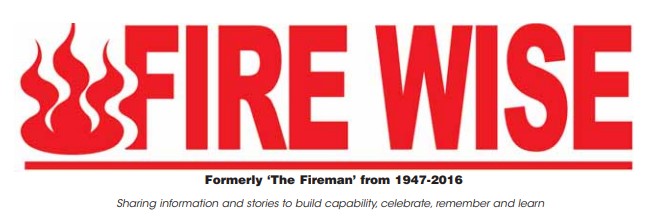
The May 2021 edition of Fire Wise has been published online only, this edition and past editions are available from the Fire Wise website.
You can support Fire Wise and the role it plays as an independent voice in keeping volunteers informed by becoming a subscriber. To become a Fire Wise subscriber visit the Fire Wise website or contact the Managing Editor of Fire Wise, Gordon Rippon-King either by phone 0402 051 412 or email This email address is being protected from spambots. You need JavaScript enabled to view it.
Nominations for trust fund
The VFBV Board is calling for nominations to the CFA and Brigades Donations Trust Fund.
The purpose of the Trust Fund is to raise and receive money and donations of goods and services from the public for distribution to Brigades, to assist with costs of purchasing and maintaining firefighting equipment, facilities, training and resources and administrative expenses of Brigades which are associated with their firefighting functions.
Following nominations, five new or reappointed members will be appointed by the VFBV Board to serve as VFBV Trustees on the Trust Fund for a term of two years.
One member has advised they will not be re-applying; all other members are eligible for re-appointment.
The Trust Fund committee meets quarterly, either via teleconference or at CFA HQ.
The appointments to come into effect as from the Trust’s AGM which is normally held July/August.
Nominations close Friday 11th June 2021 and can be mailed to VFBV office, 9/24 Lakeside Drive, Burwood East 3151 or emailed to This email address is being protected from spambots. You need JavaScript enabled to view it.
VFBV Affiliation
Thank you for members’ strong show of support. VFBV affiliation rates averaging 95% over the past five years, shows the value of our unified voice is clearly recognised and demonstrates strong support for the important work that VFBV does on behalf of all CFA volunteers.
The 2021/22 renewal notices for your Brigade/Group’s VFBV Affiliation and Welfare Fund have been forwarded to all Brigades and Groups with a due date of 30 June 2021. As well as affiliating with VFBV we strongly encourage Brigades to subscribe to the VFBV Welfare Fund.
The Welfare Fund provides small grants of up to $5,000 to assist volunteer members, their immediate family members and long serving ex members. The grants support members experiencing personal financial hardship/crisis by providing welfare grants on a needs assessed basis, that may assist in alleviating stresses impacted on the individual ability to maintain involvement as a volunteer.
In recognition of the significant donations received to the Welfare Fund from the public following last year’s devastating bushfires, a one off 50% discount is being offered for the 2021/22 Welfare Fund Subscription, reducing the cost to all Brigades this year to $45.00.
Both the VFBV Board and the Welfare Fund Committee see this as a way of supporting the many Brigades who have subscribed to the Welfare Fund since 1913. It is hoped that this reduced cost will encourage new Brigades to join the Welfare Fund this year for the benefit of their members. This is a very low cost to ensure that your members are covered should they find themselves in financial hardship for whatever reason.
Brigades and Groups that pay VFBV affiliations before 30th June 2021 will automatically go into the draw to win their choice of one of the worthwhile prizes kindly donated by GAAM - G-Force Nozzle with Quick connect coupling; Gated Wye with Stortz Inlet and quick connect outlets; Root Soaker; TFT Break Apart Nozzle; or from Powdersafe - five Helmet Torches and carry case; or donated by CFA six Uniden Digital Scanners. VFBV sincerely thanks GAAM Emergency Products, Powdersafe Pty. Ltd. and CFA for the continued generous support in providing these prizes. For further details of prizes on offer, see the flyer included with the VFBV invoices sent to your Secretary last month.

2021-22 VESEP Applications
Applications for the 2021-22 Volunteer Emergency Services Equipment Program (VESEP) are now open, brigades and groups have until Friday 18 June 2021 to submit their application.
Now in its 21st year, VESEP provides grants of $2 for every $1 of Brigade or Group funding to assisting in acquiring a wide range of additional equipment. There are five categories which grants can be applied for: volunteer amenities, minor works, operational equipment, specialist appliances and Field Command Vehicles and Tankers.
The VESEP program also includes a Special Access Grant which acknowledges that many brigades and groups are restricted in their ability to fundraise for their contribution towards a project and are able to apply to reduce or in some cases eliminate altogether the brigade or group contribution towards a grant. VFBV encourages any brigade or group in this situation to take advantage of the Special Access Grant.
To assist brigades and groups with their applications, VFBV has updated our application help pack for 2021, which also includes the Special Access grant and other application forms and all CFA information sheets. The Application Help Pack is available for download from the VFBV website. If you would like a printed copy, please contact the VFBV office on 03 9886 1141 and we can post you a copy.
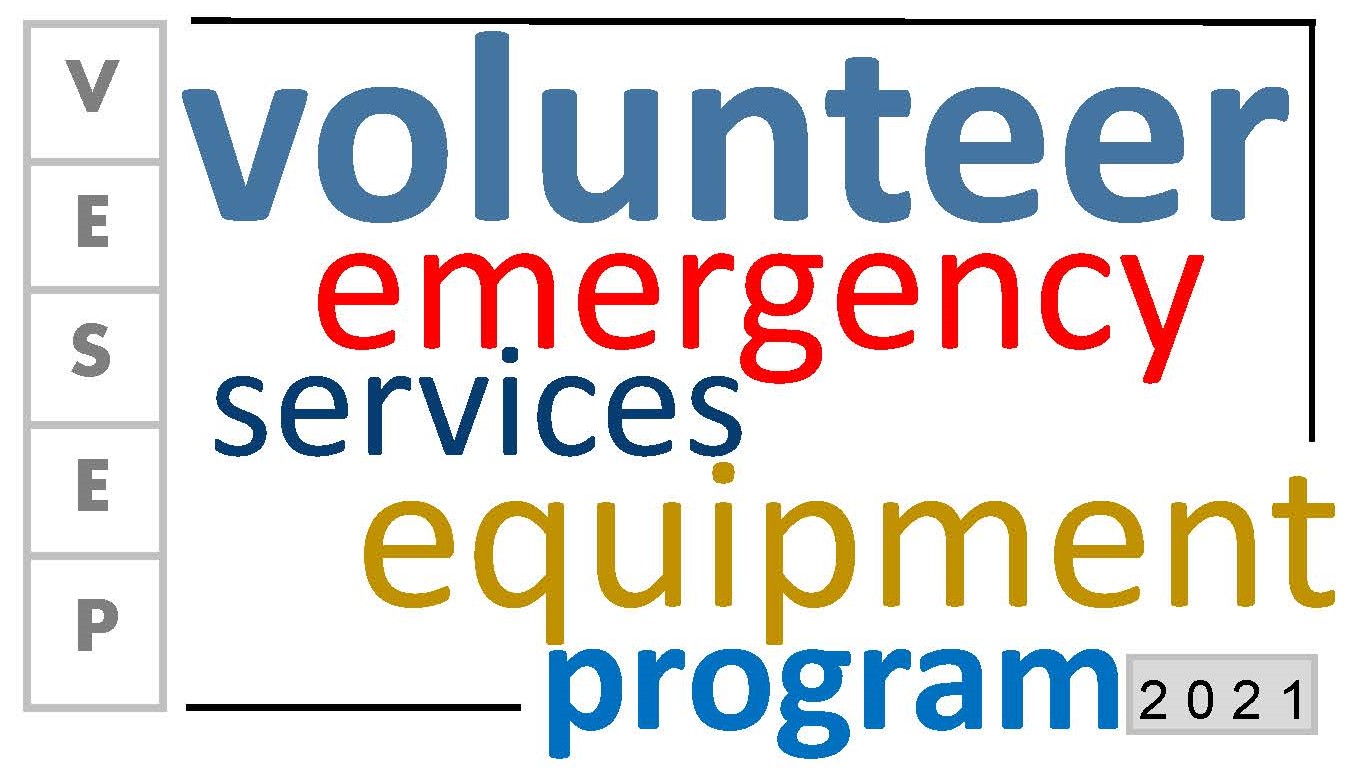
Zero BAC
Members are reminded that Victoria’s road rules have been recently changed that now make it a requirement for all drivers of vehicles weighing 4.5 tonne or more to have a zero-blood alcohol concentration. This applies to the vast majority of trucks in CFA’s fleet.
In essence, any truck that you cannot drive with a standard car license is now defined as a “heavy” vehicle. There are harsh penalties for any driver who exceeds the zero limit – with the same penalties that apply to other legal limits. All offences incur a large fine, loss of license, mandatory behaviour change program attendance and an alcohol interlock requirement.
Both State Council and the VFBV Board have recently discussed this issue and are calling on the Government to remove caps, limits and budgetary pressures currently in place that restrict CFA volunteers’ ability to upgrade their licenses and access driver training. Significant investment is now required to increase our driver capability and number of available drivers to account for the significant vigilance required to monitor zero BAC.
We continue to escalate to the Minister the complete lack of mandatory consultation, planning and resourcing for a change impacting CFA and SES’s effective 24/7 on-call workforce and take particular note of the complete lack of public education campaigns to educate not only members – but all Victorian and interstate drivers who are impacted by these changes.
VFBV is in the process of contacting brigades to determine what other support or assistance you may need, and members are encouraged to respond and assist with our advocacy.
VFBV Board Vacancies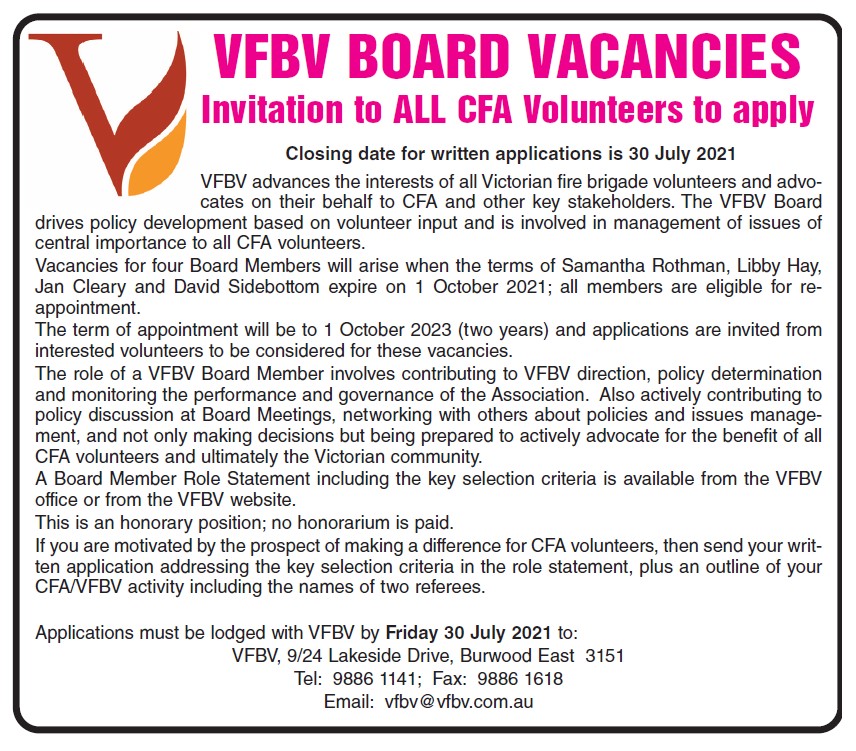
Central Highlands road names
CFA has recently engaged with VFBV to consult on naming conventions for the road network at Central Highlands Training Campus. The final names will be chosen by the CFA Chief officer and CEO.
This is an encouraging opportunity to recognise and honour the dedication of key CFA people by naming a road after them. VFBV is seeking nominations of inspirational women, men, operational and non-operational members who have made a significant contribution to CFA and/or CFA training.
We encourage everyone to think about those within their networks who may have profoundly provided a large amount of time and energy into CFA Training in particular and would be worthy of such a nomination.
Nominations are being sought via District Councils and the CFA/VFBV Joint Training Committee. Nominations are requested to include background information to assist with the shortlisting process.
Contact VFBV Support Officer Chris Dent This email address is being protected from spambots. You need JavaScript enabled to view it. or 0407 334 685 if you wish to submit a nomination.
Wodonga “Town Hall” Meeting
The Honourable Jack Rush QC has penned an open letter to CFA brigades inviting them to the first “Town Hall” style meetings to obtain the views of CFA members on key issues impacting on the CFA.
Mr Rush is a former Supreme Court Judge, and was senior counsel assisting the Victorian Bushfires Royal Commission following the devastating Black Saturday Fires. He is Chair of the independent CFA Advisory Committee established by the Victorian Liberal/Nationals to provide it recommendations on future CFA policy. The Committee is independent of politics and comprised of persons with experience in emergency services and volunteer fire fighting.
The first “Town Hall” style meeting is to be held on Thursday 3rd June at the RSL Wodonga at 7:30pm. The Committee is chaired by former Supreme Court judge Mr Jack Rush QC, is independent of politics and comprised of persons with experience in emergency services and volunteer firefighting. You can access a copy of the open letter here.
The meeting will be approximately 1hr 30 minutes and will be conducted by an independent facilitator to ensure as far as possible, all voices are heard and topics remain relevant.
All CFA volunteers are invited to attend, with registration preferred to ensure compliance with COVID-19 density limits. You can register at http://bit.ly/CFATownHall or if you are not available or wish to provide feedback in writing visit: www.rebuildthecfa.com.au/volunteer/
MCG Stadium Stomp
The MCG Stadium Stomp will take place on Saturday 12 June 2021.
As part of the event, the Emergency Services Foundation (ESF) will be raising funds to support the continued efforts of the foundation to prevent, promote and address the incidence and impact of mental injury for the 125,000 emergency management volunteers and paid staff who serve Victoria.
If you wish to take part in Stadium Stomp 2021 visit the ESF website to find out how to register and support ESF as your charity as well as instructions for how to participate in the in the Emergency Services Wave of participants.
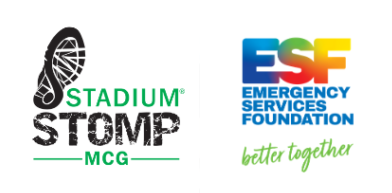
Recent articles on the VFBV website
Return of championships to help fire brigade recruitment
International Firefighters’ Day
2021-22 VESEP – VFBV Help Pack
VFBV Board Vacancies: Invitation to apply
Enjoy the VFBV monthly newsletter?
If you enjoy reading the VFBV newsletter each month, why not share it with your fellow volunteers?
Either share this page with others who may enjoy the articles or encourage other volunteers to sign up to receive their own copy via email each month here.
Applications should be submitted to your District ACFO by Friday 18 June 2021.
Applications are now open for the 2021-22 Volunteer Emergency Services Equipment Program (VESEP), with the closing date fast approaching. VFBV has updated its VESEP Help Pack to assist brigades and groups with their VESEP applications.
VESEP provides grants of $2 for every $1 of Brigade or Group funding to assist brigades and groups in acquiring a wide range of additional equipment in recognition of the significant contribution emergency service volunteers provide in supporting Victorian communities.
Now in its 21st year, VESEP first started out as the Community Safety Emergency Support Program in 2000 and was designed in close consultation with VFBV and volunteers, with the intent being a grants program designed by volunteers with minimal administration required from volunteers.
Since 2000, the program has funded over 200 projects totalling more than $140million dollars, as a investment in maintaining and building volunteer capability by supporting volunteers through grants in five categories:
- Volunteer amenities under $5,000
- Minor works under $100,000
- Operational Equipment
- Specialist Appliances and Field Command Vehicles
- Tankers*
*as with previous years, CFA have advised that additions to the fleet will be afforded a low priority with only exceptional circumstances being considered by the Chief Officer. An Addition to the Fire Fighting Fleet form will be required to be completed and approved by the District ACFO and Regional DCO.
VFBV’s VESEP Application Help Pack is again available in 2021 to assist Brigades and Groups in completing their application, with the pack divided into easily downloadable sections at the bottom of this page.
| VFBV VESEP Help Pack |
Contains general information about VESEP and some handy hints on how to complete your application. |
| Attachment 1 |
Application forms for Special Access Grants The Special Access Grant can reduce or in some cases eliminate all together the Brigade/Group contribution. |
| Attachment 2 |
CFA VESEP Guidelines The guidelines outline criteria, aims and requirements that Brigades/Groups need to consider for their application to be completed. |
| Attachment 3 |
CFA Application Forms Provides Brigades and Groups with application forms for Part A: Vehicles and Operational Equipment, Part B: Volunteer Amenities and Minor Works, Addition to the Fire Fighting Appliance Fleet Operational Justification and FCV Vehicle Weight Proforma. |
| Appendix |
CFA Information Sheets Collates all information sheets produced by CFA to assist with Brigade and Group applications and ideas. |
Key Dates
18 June 2021: Applications close, and should be submitted by this date to your District AFCO using the CFA application forms.
19 June – 4 July 2021: DPC meetings held to review and endorse applications.
End September 2021: Anticipated Ministers announcement of successful projects.
Additional Support
If you need any assistance with you Application please contact your local VFBV State Councillor, VFBV Support Officer of the VFBV Office. You can also email This email address is being protected from spambots. You need JavaScript enabled to view it.
If you would like a printed copy of the VFBV 2021 VFBV Application Help Pack please call the VFBV office on 03 9886 1141 ad we will post one out.
VFBV wishes all CFA Brigades and Groups well with your applications and thank you for your untiring service to Victoria!
International Firefighter's Day (IFFD) is observed each year on the 4th May. This is also St Florian's Day, who is the patron saint of firefighters. Each year, CFA and VFBV come together to honour our fallen firefighters through the annual memorial service which is each year commemorated on the Sunday closest to May 4th. By proudly wearing and displaying blue and red ribbons pinned together or by participating in a memorial or recognition event, we show our gratitude and respect to firefighters and their families everywhere. The blue and red ribbons are linked to colours symbolic of the main elements firefighters work with – red for fire and blue for water.
This years service was held on Sunday 2 May in Melbourne CBD and presented an opportunity for those attending to visit the new Victorian Emergency Services Memorial.
The memorial site, which was completed late last year, is situated inside the Treasury Gardens and honours fallen members from CFA, MFB (now FRV), VICSES, Forest Fire Management Victoria, Ambulance Victoria, Life Saving Victoria and Marine Search and Rescue.
The annual service presents a time for us to come together and remember and honour the 80 CFA firefighters (including 11 from pre-1944 who died prior to the formation of CFA under the Country Fire Brigades Board).
The 2021 service also represented a chance to add an additional CFA firefighter to the honour roll, Phillip McGennisken from Wonwondah Rural Fire Brigade died while undertaking a roadside burn in 1957. CFA has only recently been advised of Phillip’s death in 1957 and his name will now be added to the roll of honour alongside 79 other CFA firefighters. The full role of honour can be found on CFA’s website here. <<https://www.cfa.vic.gov.au/about/roll-of-honour>>
Following the cancellation for the 2020 Memorial Service due to COVID-19 restrictions, the service also recognised the losses during the 2019-20 fire season of three Victorian firefighters from Forest Fire Management Victoria Bill Slade, Mat Kavanagh and David Moresi. Three New South Wales firefighters from the NSW Rural Fire Service, Geoffrey Keaton, Andrew O’Dwyer and Samuel McPaul. And North American firefighters Ian McBeth (Montana), Paul Hudson (Arizona) and Rick DeMorgan Jr (Florida).
The service was also available for livestream on Sunday and you can view a reply of the service here https://livestream.com/cfavic/events/9647685/videos/220636636 the service starts approximately 14 minutes in).
Volunteer Fire Brigades Victoria (VFBV) CEO, Adam Barnett spoke about the importance of the annual memorial service for not only the families, friends and loved ones of our fallen, but for all members.
“The annual memorial service is a time for us to come together either in person or in spirit and remember and honour the 80 CFA firefighters (including 11 from pre-1944) who have selflessly given their lives to protect the lives of other Victorians.”
“And while the service is always solemn and reflective, it is also an important opportunity to reflect on our history as we pay tribute to those lost – and reflect on the importance of the work we all do in making our communities safer.”
The 2022 Annual Memorial Service will be held on Sunday 1 May 2022 with a location to be advised closer to the date.

About the Annual Memorial
The annual memorial event honours firefighters who have lost their lives in the line of service and is held on the closest Sunday to 4 May, which is St Florian’s Day (the patron saint of firefighters) and International Firefighters Day.
We wear blue and red ribbons to pay tribute to our fallen. The ribbons are linked to colours symbolic of the main elements firefighters work with – red for fire and blue for water. These colours also are internationally recognised as representing emergency service.
St. Florian is the Patron Saint of Firefighters and was an officer of the Roman army who was responsible for organising and leading firefighting brigades tasked to fight fires when Rome needed to protect itself against fire being used as an offensive weapon in the third century.
On St. Florian’s Day, firefighters, families and communities across the world take a moment to acknowledge firefighters commitment and dedication to their communities and their selfless duty to protecting lives and property.
The Annual Memorial Service is a formal and reflective day to acknowledge and remember those that have made the ultimate sacrifice on behalf of their communities. It’s a time for reflection and just one of the ways we can remember the lives of 69 CFA members and 11 Country Fire Brigades Board firefighters (prior to the formation of CFA), who have paid the ultimate sacrifice and given their lives in service to protecting our communities.
The Annual Memorial Service will be held on Sunday 2 May in Melbourne to honour firefighters who have lost their lives in the line of duty.
Nearby, the new Victorian Emergency Services Memorial offers another opportunity for people to pay their respects.
After a pandemic-related cancellation of last year’s event, CFA is pleased to again pay tribute and respect to its fallen firefighters who have lost their lives in the line of duty.
This year’s memorial service will mark the 33rd event, which has been held since 1987.
Location: Sofitel On Collins, Melbourne CBD
Date: 2.00pm on Sunday 2 May
The 2021 Annual Memorial Service for Firefighters is a free event, to attend please send an email to This email address is being protected from spambots. You need JavaScript enabled to view it. by Wednesday 21 April. Tickets are limited due to the venue’s capacity and the event’s Covid-19 safety regulations.
Family members and friends, CFA and Volunteer Fire Brigades Victoria (VFBV), executives as well as government representatives will come together to lay wreaths, light candles, remember lives and honour the personal sacrifices and commitment firefighters make each and every day.
The ceremony will include incredible performances from one of the original singers of The Ten Tenors, Tod Strike, who will undoubtedly give the ceremony a fantastic musical touch.
Junior CFA members will also attend the memorial service and will be actively involved throughout the ceremony by assisting wreath layers and patrons.
CFA Chief Executive Officer Natalie MacDonald will attend the service together with CFA Chief Officer Jason Heffernan.
“The Annual Memorial Service is a time when we honour, recognise and reflect on the personal sacrifices made by our firefighters, their families and colleagues," Natalie said.
"We at CFA continue to adapt and evolve to deliver the same vital services to our community, with our number one priority the health of our volunteers and staff," CFA Chief Officer Jason Heffernan added. "But we never forget all of our fallen firefighters; forever remembered with love and respect."
VFBV CEO Adam Barnett spoke about the importance of the annual memorial service for not only the families, friends and loved ones of the fallen, but for all members.
“The annual memorial service is a time for us to come together either in person or in spirit to remember and honour the 79 CFA firefighters (including 11 from pre-1944) who have selflessly given their lives to protect the lives of other Victorians.
"And while the service is always solemn and reflective, it is also an important opportunity to reflect on our history as we pay tribute to those lost and reflect on the importance of the work we all do in making our communities safer.”
This year’s Memorial Service will give attendees the opportunity to visit and view the new Victorian Emergency Services Memorial.
Completed in 2020, the memorial site is situated in a quiet and peaceful section of the Treasury Gardens and honours fallen members from CFA, MFB (now FRV), VICSES, Forest Fire Management Victoria (FFMV), Ambulance Victoria, Life Saving Victoria and Marine Search and Rescue (MSAR).
The section of the memorial which is dedicated to CFA shows the names of all 79 fallen firefighters and includes the original plaques from the firefighter memorial at Fiskville.
Return of championships to help fire brigade recruitment
Written by VFBVVFBV Media Release - March 2021
In his 50 years as coach of the Springhurst Fire Brigade championship team, Kevin Atteridge has seen as many success stories off the field as on it.
While the championships help brigade volunteers and juniors to hone their skills, they also serve as a volunteer recruitment tool.
The return of CFA / VFBV state championships at Mooroopna after a COVID-forced hiatus in 2020 has been good news for the volunteer movement.
“I’ve been doing this for over 50 years and I look back at the amount of people who’ve come through the junior championships who are now holding positions with Fire Rescue Victoria, police or volunteering with their local brigade,” Mr Attridge said. “They still speak highly of Springhurst and what they got out of the brigade and the championships.”
This year Springhurst had three senior and two junior teams competing, a similar number to previous years.
“I’m rapt in the numbers and really happy the championships were back,” Mr Atteridge said. “We won’t get everyone in the junior competition to become a senior and train to become a volunteer firefighter, but we’ll get a proportion which is important for a small rural area.
“If you can get a junior involved, you can get mum and dad or boyfriends and girlfriends. That’s how we’ve done it for years.”
Springhurst is a strong brigade with 32 operational members and more than 100 members, including helpers behind the scenes.
Mr Atteridge said the championships bring the community together. “We’re only a small town, so it’s a good thing to get together. It’s very much social but when we started, I said do we want to have fun or are we here to win and they all wanted to win, so we have to put the miles in.”
The story is the same at nearby Eldorado where captain Brian Bowman says the championships have inspired generations of new volunteer firefights.
“We’ve had a lot of success with both junior and senior competitions but the biggest thing is gaining younger firefighters for the future, not only for us but for smaller brigades that feed their juniors into our teams. They’re a success story that way.”
The brigade is well positioned with about 40 active members.
Both volunteer veterans said they were pleased the championships could be revived this year to ensure their long-term viability.
“We’ve been working hard to make sure it goes ahead,” Mr Bowman said.
For the first time, all CFA / VFBV State Championship events were held at the same venue at Mooroopna Recreation Reserve on consecutive weekends, with protocols in place to ensure the events are run in a COVID safe and child safe manner. The Junior Urban Championships were held on Saturday and Sunday March 20-21, and the Senior Urban, and Senior and Junior Rural Championships on March 27-28.
Due to COVID-19 restrictions, the championships were not open to spectators.
Volunteer Fire Brigades (VFBV) CEO Adam Barnett said championship events are an important tradition and part of the volunteer commitment to firefighter safety. “They play an important role in brigade discipline and morale as well as providing a terrific opportunity for members and families to come together to celebrate the incredible work that our volunteers do for their communities throughout the year.”
Springhurst Senior Results
Springhurst B 1st, Division 2, Low Down Pump and Ladder
Springhurst A 1st, Division 1, Tanker – Priming, Pumping and Ladder
Springhurst C 4th, Division 3, Tanker – Priming, Pumping and Ladder
Springhurst C 4th, Division 3, Hydrant and Tanker
Springhurst B 2nd, Division 2, Tanker – Drawing Water from Tank
Division 2 Aggregate
Springhurst B 3rd
Senior Firefighter Sprint
1st Male, Connor Cryer, Springhurst Fire Brigade
Springhurst Junior Results
Springhurst A 1st Hose and Ladder 11-15 yrs
Springhurst A 3rd, Tanker drawing water from Tank 11-15 yrs
Springhurst A 1st, Tanker Priming Pumping and Ladder 11-15 yrs
Springhurst A 2nd, Hydrant and Tanker 11- 15 yrs
Springhurst B 3rd, Tanker drawing water from Tank 11-13 yrs
Springhurst B 2nd Tanker Priming Pumping and Ladder 11-13 yrs
Springhurst B 5th Low Down Pump and Ladder 11-13 yrs
11 – 15 years aggregate
Springhurst A 2nd
Champion Team
Springhurst A 3rd
Junior Firefighter Sprint
11-15 yrs Female, Emma Beattie – Springhurst Fire Brigade
11-15 yrs Male, Lachie Lewis – Springhurst Fire Brigade
Eldorado Senior Results
Eldorado A 2nd, Division 1, Low Down Pump & Ladder
Eldorado A 3rd, Division 1, Hose and Ladder
Eldorado A 3rd, Division 1, Tanker - Priming, Pumping & Ladder
Eldorado A 2nd, Division 1, Tanker Drawing Water from Tank
Division 1 Aggregate
Eldorado A 2nd
Eldorado Junior Results
Eldorado A 2nd, Low Down Pump and Ladder, 11-15 years
Eldorado A 3rd, Hose and Ladder, 11-15 years
Eldorado A 3rd, Tanker – Priming, Pumping and Ladder, 11-15 years
Eldorado A 3rd, Hydrant and Tanker, 11-15 years
Eldorado A 4th, Drawing Water from Tank, 11-15 years
11-15 years aggregate
Eldorado A 3rd
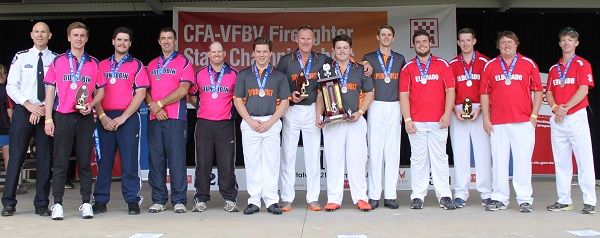
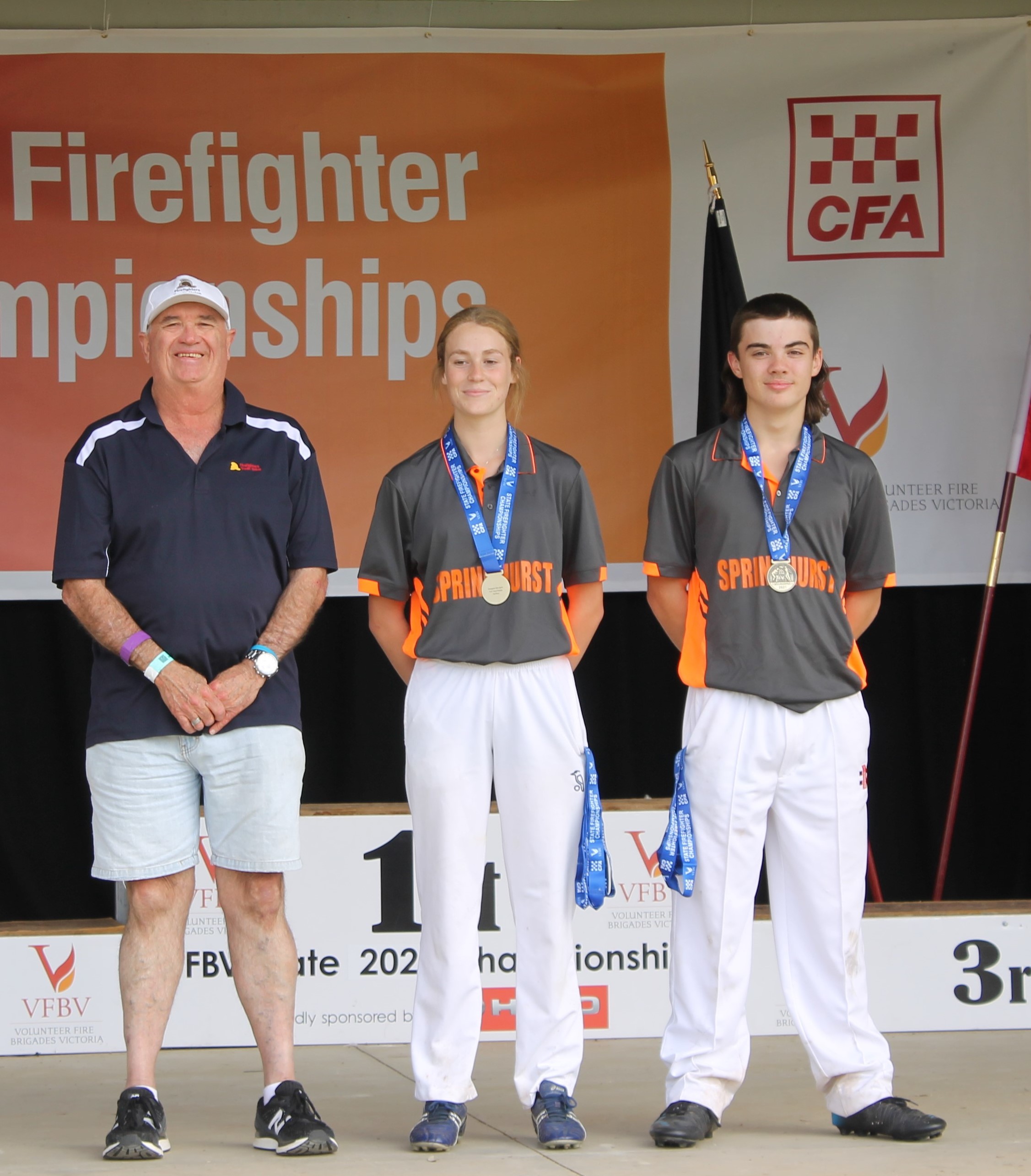
Vaccine, Champs and Road Safety
By Adam Barnett, VFBV Chief Executive Officer
The Australian Government’s national COVID-19 vaccination rollout is underway, and I am pleased to confirm that CFA and SES volunteers are eligible for access to vaccination under phase 1B of the program that commenced rollout last week.
1B vaccinations are being made available to specific groups of people based on recommendations by the Australian Technical Advisory Group on Immunisation, and from a VFBV perspective, I wish to personally thank the Federal Health Minister the Hon Greg Hunt MP for engaging with VFBV and allowing us the opportunity for input.
Phase 1B vaccinations include critical and high-risk personnel including defence, police, emergency and fire services as well as remaining health care workers who were not covered under phase 1A and includes members of the general population considered higher risk such as people aged 70 and over, Aboriginal and Torres Strait Islander people, aged care/disability workers and licensed meat processing workers.
Vaccinations under the 1B phase for emergency management personnel are limited due to supply and are being coordinated at a State level. Vaccinations are only available by appointment only, and you will need to confirm your eligibility when making an appointment. The CFA Chief Officer has released a guidance note to guide members to help make an informed decision about preferred priority order, noting that vaccination is not mandatory.
I would also remind members that phases 2A and 2B which covers the balance of the adult population are projected to commence later this year from as early as May/June and ramping up significantly during Q3 of this year, so I urge members to review the Chief’s advice when conducting your own self-assessment on access. Members involved in CFA Emergency Medical Response (EMR) and Road Accident Rescue (RAR) have been recommended as priority 1.
The Victorian Department of Health has established two high-volume vaccination centres located in Melbourne, but members are also able to access 1B through eligible GP’s. Details on how to access each are available via the CFA and VFBV websites.
STATE CHAMPIONSHIPS
This year’s State Championships were hugely successful, and I want to congratulate all participating brigades and members on their performance.
For the first time in our history, all four State Championships (Rural & Urban Juniors and Rural and Urban Seniors) were held in the same location (Mooroopna) on sequential weekends. And while numbers were significantly down from previous year’s due to COVID restrictions, across the two weekends we had 161 teams comprising of 992 individual competitors. And while the events were closed to the general public due to restrictions, and interstate teams from both WA and NSW were unable to attend - the atmosphere was terrific.
This year’s Victorian/Western Australia Challenge which is traditionally held each year at the end of the Urban Seniors Championship was conducted virtually this year, with Victoria filming its team run, with WA due to similarly film their run back in WA. Despite calls for a ‘do-over’ and proving the honour system is alive and well, sadly, Victoria’s run was a miss, therefore WA will retain its title from its win back in 2019, where it was won with a time of 27:49 seconds.
I was very pleased to observe bi-partisan support with Mr Paul Edbrooke MP representing the Minister for Police and Emergency Services, and Mr Tim Smith MP representing the coalition as the Shadow Minister for Emergency Services, as well as local MP’s The Hon. Wendy Lovell MP and independent Ms Suzanna Sheed MP. It was wonderful to catch up with each and observe their support and encouragement of CFA volunteers and juniors.
I also want to extend my thanks to CFA and acknowledge their renewed and strengthened commitment to the Championships. The CFA corporate marquee was very well attended, and almost all directorates where present and offering member services and information to attendees. There was also a terrific show of support by the CFA Executive and leadership, including CFA Board members Beth Davidson, Dawn Hartog and Peter Shaw, CFA CEO Natalie MacDonald, Chief Officer Jason Heffernan, as well as good attendance from Executive Directors, Deputy Chief Officers, DMO’s and CFA staff. I also thank Commissioner Andrew Crisp for his continued support and attendance.
Special thanks also to the Assistant Chief Officers and Commanders who attended over the weekends and I thank them for their continued dedication and loyalty to CFA and CFA volunteers. With all the controversy surrounding fire services reform, it is incredibly important to recognise those of our seconded officers who continue to go above and beyond for their brigades, groups, and members. VFBV is very grateful and appreciative of the work you do. Thank-you, and please know we are proud of you and continue to welcome and embrace you as part of the CFA family.
Lastly, but my no means least, may I also thank the City of Greater Shepparton, the 220 VFBV volunteer judges and officials, our competition committees, volunteers and staff who all worked tirelessly to make this years Championships happen.
For those in the know, it was extremely difficult and time consuming to not only attain the necessary event approvals, and satisfy the ever-changing health and COVID restrictions, but to pull it off and run the two weekends so smoothly and without incident is a credit to everyone involved. Special thanks to Host Committee Chair Alan Davies and his team of volunteers and staff, as well as DCO Peter O’Keefe and his team in the Volunteerism directorate, with a special call-out to Melanie Causer, Volunteers Program Leader for all her and her teams exceptional work done behind the scenes.
Thank-you also to my team and all the dedicated volunteers that toil away each year to make these events such a success.
0.00% BAC
Sadly, just prior to print deadline, we have been very much disappointed to again discover significant legislative reform pushed through Parliament during lockdown and without volunteer, or it appears emergency service agency consultation, planning or engagement.
Changes to Victoria’s Road Safety Act was announced via the Government Gazette dated Tuesday 30 March and proclaimed to come into effect just one day later on the 1 April 2021.
Among amendments was section 40 of the Act, where “large vehicle” was changed to “heavy vehicle” having the effect of introducing a 0.00% blood alcohol concentration for any person driving a vehicle over 4.5 tonne GVM. This restriction, had previously only applied to vehicles greater than 15 tonnes.
With the new rule now applying for all vehicles over 4.5 tonne - in the CFA context this now picks up almost the entire fleet of fire appliances, not to mention impacts to the private sector, the transport industry and all interstate drivers where rules between states differ quite significantly. For example, across the border in NSW and SA the limit is 0.05 with NSW having a BAC of 0.02% for vehicles greater than 13.9 tonnes and SA a limit of zero for vehicles over 15 tonnes.
Inexplicably, there was no notice or public education campaign to educate the public about these significant changes prior to their proclamation, and even CFA confirmation was not provided some 16 hours until after the changes came into effect on April 1st. This is a significant departure from standard practice.
VFBV has escalated this matter to the Minister seeking an explanation but has yet to receive one.
To be clear, no-one is debating the merits (or not) of this change, and frankly it would be insulting to insinuate otherwise given CFA volunteers commitment to public safety. However, to introduce significant change without notice, without public education of the changes and without resourcing support for the change management journey required to mitigate its impacts on what is essentially a 24/7 on-call workforce like CFA and SES – is frankly unconscionable.
While State Council is due to discuss this matter next week, District Councils are eager to hear from brigades as to what support you require from Government and CFA to mitigate any impacts of these changes and to support and resource brigades to increase their driver capability to account for the increased regulatory burden of these changes.
In the interim, the VFBV Board is advocating for an immediate increase to volunteer heavy vehicle license upgrades and driver training to increase the available driver pool. It is simply unacceptable for volunteers to have to continue putting their hands in their own pockets or conducting fundraising activities to pay or subsidise the cost of upgrading their licenses. The public would be shocked to learn that the Government does not fully cover the cost of equipping volunteers with the appropriate licenses and training to drive the very fire trucks we are expected to use. But it would appear this simple moral obligation continues to be ignored. This needs to be addressed immediately and we will likely need your help to ensure the appropriate Ministers and officials are held accountable and the funding gap is fixed as a matter of urgency.
Fire Wise Publication – April 2021 Online edition only
The April 2021 edition of Fire Wise has been published online only, this edition and past editions are available from the Fire Wise website.
You can support Fire Wise and the role it plays as an independent voice in keeping volunteers informed by becoming a subscriber. To become a Fire Wise subscriber visit the Fire Wise website or contact the Managing Editor of Fire Wise, Gordon Rippon-King either by phone 0402 051 412 or email This email address is being protected from spambots. You need JavaScript enabled to view it.

Nominations for Trust Fund
The VFBV Board is calling for nominations to the CFA and Brigades Donations Trust Fund. The purpose of the Trust Fund is to raise and receive money and donations of goods and services from the public for distribution to Brigades, to assist with costs of purchasing and maintaining firefighting equipment, facilities, training and resources and administrative expenses of Brigades which are associated with their firefighting functions.
Following nominations, five new or reappointed members will be appointed by the VFBV Board to serve as VFBV Trustees on the Trust Fund for a term of two years. One member has advised they will not be re-applying; all other members are eligible for re-appointment.
The Trust Fund committee meets quarterly, either via teleconference or at CFA HQ, with the appointments to come into effect as from the Trust’s AGM which is normally held July/August.
Nominations close Friday 11th June 2021 and can be mailed to VFBV office, 9/24 Lakeside Drive, Burwood East 3151 or emailed to This email address is being protected from spambots. You need JavaScript enabled to view it.
State Championships a great success
The inaugural combining of Urban Senior events and Rural events, Seniors & Juniors, was an outstanding success according to feedback from those attending last month at Mooroopna. This was the first occasion in competition history that Urban and Rural events had been conducted at the same venue, at the same time, running alongside each other on their own traditional competition tracks.
The State Urban Junior Championship held at Mooroopna the week before, was also a successful weekend with nearly 300 Junior members from 41 teams competing to be the 2021 State Urban Junior Champions, which was won by Melton by a significant margin.
The following weekend also winning by significant margins were Kangaroo Flat at the Urban Seniors and Beazley’s Bridge at the Rural Seniors, with Strathmerton being named the Champions at the Rural Juniors. See full results of the 2021 State Championships on pages 10-12 of the April edition of Fire Wise, or visit the VFBV website.
VFBV passes on its appreciation to everyone involved, particularly the State Championship Committee which consists of CFA management, members of both VFBV Rural and Urban State Committees and staff for their work and efforts in the preparation and management of both weekends, added to which was the additional workload in ensuring the events complied with all COVID Safe requirements.
Our congratulations to everyone involved – well done.
We also pass on our appreciation to the Greater Shepparton City Council for their continued support of our Championships, this being the ninth occasion that our Championships have been held in the Shire.
No doubt the State Championship Committee and VFBV’s two competition committees will over the coming months, consider any improvements for next year. Feedback from Brigades and competitors would be welcomed by VFBV and can be mailed to the VFBV office or emailed to This email address is being protected from spambots. You need JavaScript enabled to view it.

Recognition of Prior Learning
VFBV delegates on the Joint Training Committee are assisting CFA in the development of RPL (Recognition of Prior Learning) packages for both Prepare, Test and Maintain Response Equipment – PUAEQU001 and Operate Pumps - PUAFIR309.
Prepare, Test and Maintain Response Equipment is currently available for nomination through LMS with Operate Pumps still being worked through however pre-nominations are available through LMS.
VFBV delegates have been requesting RPL packages to be made available to Volunteers for some time and are happy this has finally eventuated but are less than impressed about the circumstance that has finally prompted CFA to develop these packages.
RCH Support
Congratulations once again to CFA members for their incredible contribution and support to the Royal Children’s Hospital Good Friday Appeal.
This year brigades raised over a million dollars to buy medical equipment and ensure kids are provided with the best possible treatment and care.
One of the most iconic and familiar sights of the Appeal is the thousands of volunteers rattling purple tins on fire trucks and standing at traffic lights right across Victoria. Brigades have been involved with this annual event since 1951, and over that time have raised in excess of $34 million dollars.
Well done!

VFBV Board Vacancies

More information about the VFBV Board vacancies can be found here.
CFA Annual Memorial Service
The Annual Memorial Service will be held on Sunday 2 May in Melbourne to honour firefighters who have lost their lives in the line of duty.
Nearby, the new Victorian Emergency Services Memorial offers another opportunity for people to pay their respects.
After a pandemic-related cancellation of last year’s event, CFA is pleased to again pay tribute and respect to its fallen firefighters who have lost their lives in the line of duty.
This year’s memorial service will mark the 33rd event, which has been held since 1987.
Location: Sofitel On Collins, Melbourne CBD
Date: 2.00pm on Sunday 2 May
The 2021 Annual Memorial Service for Firefighters is a free event, to attend please send an email to This email address is being protected from spambots. You need JavaScript enabled to view it. by Wednesday 21 April. Tickets are limited due to the venue’s capacity and the event’s Covid-19 safety regulations.
Family members and friends, CFA and Volunteer Fire Brigades Victoria (VFBV), executives as well as government representatives will come together to lay wreaths, light candles, remember lives and honour the personal sacrifices and commitment firefighters make each and every day.
The ceremony will include incredible performances from one of the original singers of The Ten Tenors, Tod Strike, who will undoubtedly give the ceremony a fantastic musical touch.
Junior CFA members will also attend the memorial service and will be actively involved throughout the ceremony by assisting wreath layers and patrons.
CFA Chief Executive Officer Natalie MacDonald will attend the service together with CFA Chief Officer Jason Heffernan.
“The Annual Memorial Service is a time when we honour, recognise and reflect on the personal sacrifices made by our firefighters, their families and colleagues," Natalie said.
"We at CFA continue to adapt and evolve to deliver the same vital services to our community, with our number one priority the health of our volunteers and staff," CFA Chief Officer Jason Heffernan added. "But we never forget all of our fallen firefighters; forever remembered with love and respect."
VFBV CEO Adam Barnett spoke about the importance of the annual memorial service for not only the families, friends and loved ones of the fallen, but for all members.
“The annual memorial service is a time for us to come together either in person or in spirit to remember and honour the 79 CFA firefighters (including 11 from pre-1944) who have selflessly given their lives to protect the lives of other Victorians.
"And while the service is always solemn and reflective, it is also an important opportunity to reflect on our history as we pay tribute to those lost and reflect on the importance of the work we all do in making our communities safer.”
This year’s Memorial Service will give attendees the opportunity to visit and view the new Victorian Emergency Services Memorial.
Completed in 2020, the memorial site is situated in a quiet and peaceful section of the Treasury Gardens and honours fallen members from CFA, MFB (now FRV), VICSES, Forest Fire Management Victoria (FFMV), Ambulance Victoria, Life Saving Victoria and Marine Search and Rescue (MSAR).
The section of the memorial which is dedicated to CFA shows the names of all 79 fallen firefighters and includes the original plaques from the firefighter memorial at Fiskville.
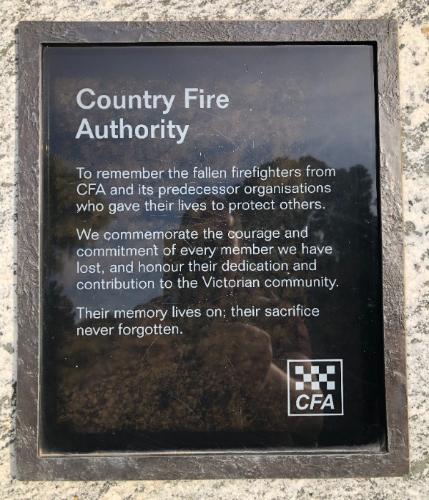
Central Highlands road names
CFA has recently engaged with VFBV to consult on naming conventions for the road network at Central Highlands Training Campus. The final names will be chosen by the CFA Chief officer and CEO.
This is an encouraging opportunity to recognise and honour the dedication of key CFA people by naming a road after them. VFBV is seeking nominations of inspirational women, men, operational and non-operational members who have made a significant contribution to CFA and/or CFA training.
We encourage everyone to think about those within their networks who may have profoundly provided a large amount of time and energy into CFA Training in particular and would be worthy of such a nomination.
Nominations are being sought via District Councils and the CFA/VFBV Joint Training Committee. Nominations are requested to include background information to assist with the shortlisting process.
Recent articles on the VFBV website
2021 State Urban Junior Championship Results
2021 State Rural Senior Championship Results
2021 State Rural Junior Championship Results
2021 State Urban Senior Championship Results
Successful VESEP Grants announced
VFBV Board Vacancies: Invitation to apply
Enjoy the VFBV monthly newsletter?
If you enjoy reading the VFBV newsletter each month, why not share it with your fellow volunteers?
Either share this page with others who may enjoy the articles or encourage other volunteers to sign up to receive their own copy via email each month here.
More...
The Australian Government’s national COVID-19 vaccination rollout is underway, and we are pleased to confirm that CFA and SES volunteers are eligible for access to vaccination under phase 1B of the program that has commenced.
1B vaccinations are being made available to specific groups of people based on recommendations by the Australian Technical Advisory Group on Immunisation.
Eligibility
People eligible for vaccination under Phase 1b are:
Elderly people aged 70 and over
Healthcare workers currently employed and not included in Phase 1a
Household contacts of quarantine and border workers
Critical and high risk workers who are currently employed
Aboriginal and Torres Strait Islander people aged 55 years and over
Adults with an underlying medical condition or significant disability
CFA and SES volunteers are covered under the Critical and High Risk Workers category, and Fire and State Emergency Services (including volunteers) are specifically referenced.
CFA Guidance
Vaccinations under the 1B phase for emergency management personnel are limited due to supply and are being coordinated at a State level. Vaccinations are only available by appointment only, and you will need to confirm your eligibility when making an appointment.
The COVID-19 vaccine is not compulsory for members of CFA, or FRV staff seconded to CFA, and CFA will not have access to any information about who has or hasn’t received the vaccine.
The CFA Chief Officer has released a guidance note to guide members to help make an informed decision about preferred priority order, noting that vaccination is not mandatory.
Tier 1
EMR (Emergency Medical Response) and RAR (Road Accident Rescue) trained volunteers
Tier 2
All operational volunteers from Class 4 and 5 brigades (brigades with higher turnouts and located in higher density areas)
All Level 3 endorsed IMT personnel
Roles critical to business continuity
Tier 3
All remaining operational volunteers
All non-operational volunteers
All remaining staff
Process for Accessing
The Victorian Department of Health has established two high-volume vaccination centres for workers currently eligible for the COVID-19 vaccination.
The two sites are located at:
• Melbourne Exhibition & Convention Centre, 1 Convention Centre Pl, South Wharf VIC 3006. 8:30 am – 4 pm, 7 days Monday – Sunday
• Royal Exhibition Building 9 Nicholson St, Carlton VIC 3053. 8:30 am – 4 pm, 6 days Monday – Saturday
Members can book their vaccination by calling the vaccine booking hotline on 1800 675 398 (dial 3, 2, 2).
Members who live in areas where 1B vaccines are being offered through their local GP or a regional health hub can also book their appointment independently if they wish.
It should be noted that the Australian Government is currently reviewing the COVID-19 vaccination program rollout as a result of advice around the AstraZeneca vaccine, so members under the age of 50 may be advised by their GP or vaccination centre that they cannot at this stage recieve the vacdcine until alternate stock can be delivered.
In accessing the vaccine, brigades and teams should consider the impact on their operational and business capacity, ensuring multiple members aren’t vaccinated at the same time.
There is potential for people to experience side effects including mild cold symptoms after receiving the vaccine, which may impact their ability to attend work or respond to incidents.
We encourage you to have these discussions with your teams as appropriate, including consideration of the priority in which they should receive the vaccine.
CFA District ACFOs are the point of contact for any brigade with operational response considerations during the vaccination program.
Full details on the Phase 1B program can be found here: COVID-19 vaccination program Phase 1b | Australian Government Department of Health
We also remind members that phases 2A and 2B which covers the balance of the adult population are projected to commence later this year from as early as May/June and ramping up significantly during Q3 of this year, so we urge members to review the CFA Chief Officer’s advice when conducting your own self-assessment on access.
Invitation open to all CFA volunteers to apply
Closing date for written applications is Friday 30 July 2021.
VFBV advances the interests of all Victorian fire brigade volunteers and advocates on their behalf to CFA and other key stakeholders. The VFBV Board drives policy development based on volunteer input and is involved in management of issues of central importance to all CFA volunteers.
Vacancies for Four Board Members will arise when the terms of Samantha Rothman, Libby Hay, Jan Cleary & David Sidebottom expire on 1st October 2021; all members are eligible for re-appointment.
The term of appointment will be to 1st October 2023 (two years) and applications are invited from interested volunteers to be considered for these vacancies.
The role of a VFBV Board Member involves contributing to VFBV direction, policy determination and monitoring the performance and governance of the Association. Also actively contributing to policy discussion at Board Meetings, networking with others about policies and issues management, and not only making decisions but being prepared to actively advocate for the benefit of all CFA volunteers and ultimately the Victorian community.
This is an honorary position; no honorarium is paid.
Prior to applying you should familiarise yourself with the following documents, each available for download at the bottom of this page:
- VFBV Board Member Role Statement including the key selection criteria
- VFBV Board Code of Conduct Policy and Declaration
- VFBV Conflict of Interest Policy
How to apply
If you are motivated by the prospect of making a difference for CFA volunteers, then send your written application addressing:
- The key selection criteria in the role statement
- An outline of your VFBV involvement and experience or in the case of there being none - outline how you have supported or advocated for VFBV positions/campaigns or supported CFA volunteer improvements
- An outline of your CFA activity
- A resume, including the names of two referees.
Applications must be lodged with VFBV by Friday 30th July 2021.
Applications should be addressed to: VFBV, 9/24 Lakeside Drive, Burwood East VIC 3151
Or via email to This email address is being protected from spambots. You need JavaScript enabled to view it. or fax (03) 9886 1618
If you have any queries, please feel free to contact the VFBV office on (03) 9886 1141.
Final results for the 2021 State Urban Senior Championship held in Mooroopna on Saturday 27 and Sunday 28 March 2021 are now available.
Grand Aggregate Results:
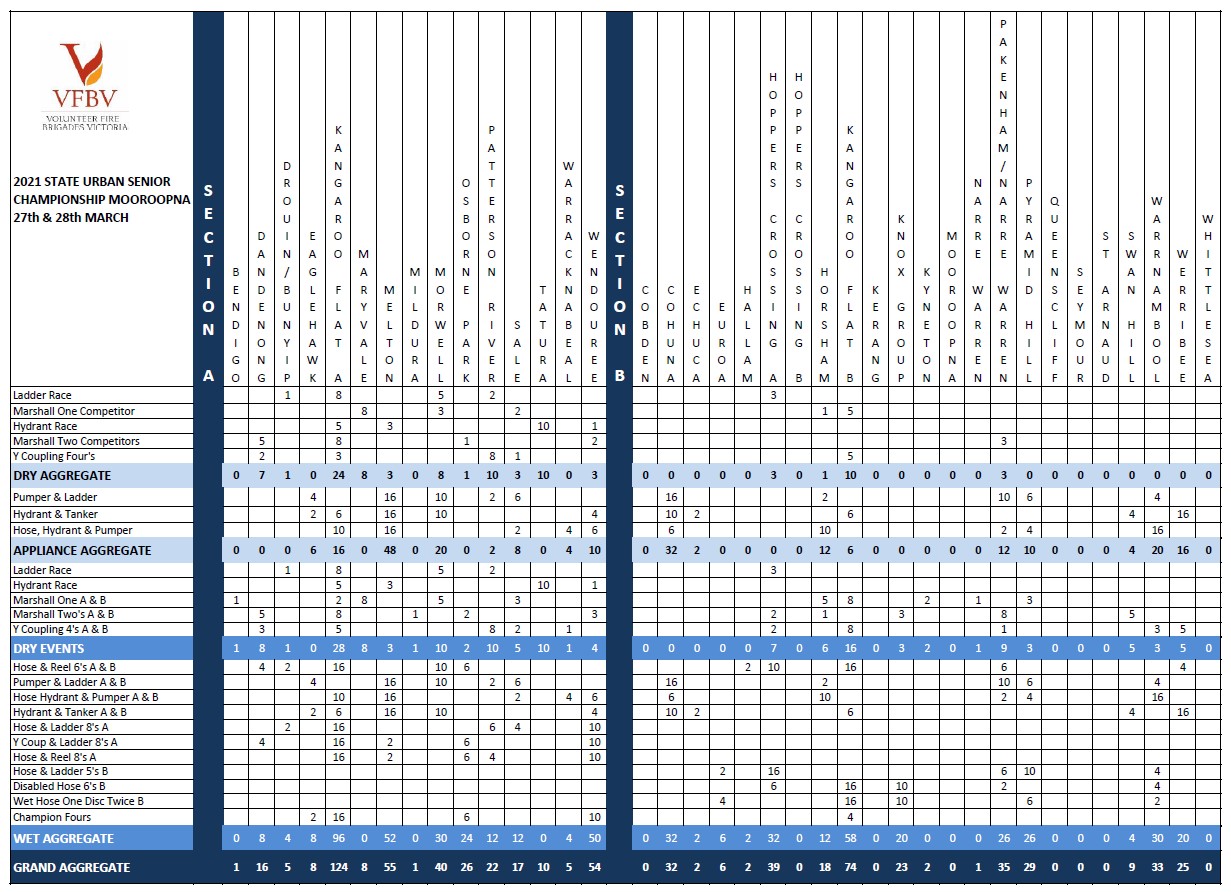
FINAL AGGREGATE RESULTS
Dry Aggregate
1st KANGAROO FLAT A 24 Points
=2nd KANGAROO FLAT B, PATTERSON RIVER & TATURA 10 Points
Wet Aggregate
1st KANGAROO FLAT A 96 Points
2nd KANGAROO FLAT B 58 Points
3rd MELTON 52 Points
SECTION AGGREGATES
‘A’ SECTION
1st KANGAROO FLAT A 124 Points
2nd MELTON 55 Points
3rd WENDOUREE 54 Points
‘B’ SECTION
1st KANGAROO FLAT B 74 Points
2nd HOPPERS CROSSING A 39 Points
3rd PAKENHAM/NARRE WARREN 35 Points
APPLIANCE AGGREGATES
‘A’ SECTION
1st MELTON 48 Points
2nd MORWELL 20 Points
3rd KANGAROO FLAT A 16 Points
‘B’ SECTION
1st COHUNA 32 Points
2nd WARRNAMBOOL 20 Points
3rd WERRIBEE 16 Points
2021 Champion Team - Kangaroo Flat A
The team members of Kangaroo Flat are Coach Jamie Hart, and competitors:
1. Jackson Dargaville
2. Thomas Dargaville
3. Jamie Hart
4. Jack Mactier
5. James Murphy
6. Jon Murphy
7. Glen Scholtes
8. Michael Villani
9. Daniel Young
2021 Champion Competitor
=1st Jamie Hart and Jon Murphy, Kangaroo Flat A 24 Points
3rd Jackson Daragville, Kanagroo Flat A 22 Points
Full results from each event and photo's of presentations can be found on VFBV's dedicated Championships Facebook page.
The place getters for each event and aggregate board are also available for download below.
Final results for the 2021 State Rural Junior Championship held in Mooroopna on Sunday 28 March 2021 are now available.
Aggregate results:
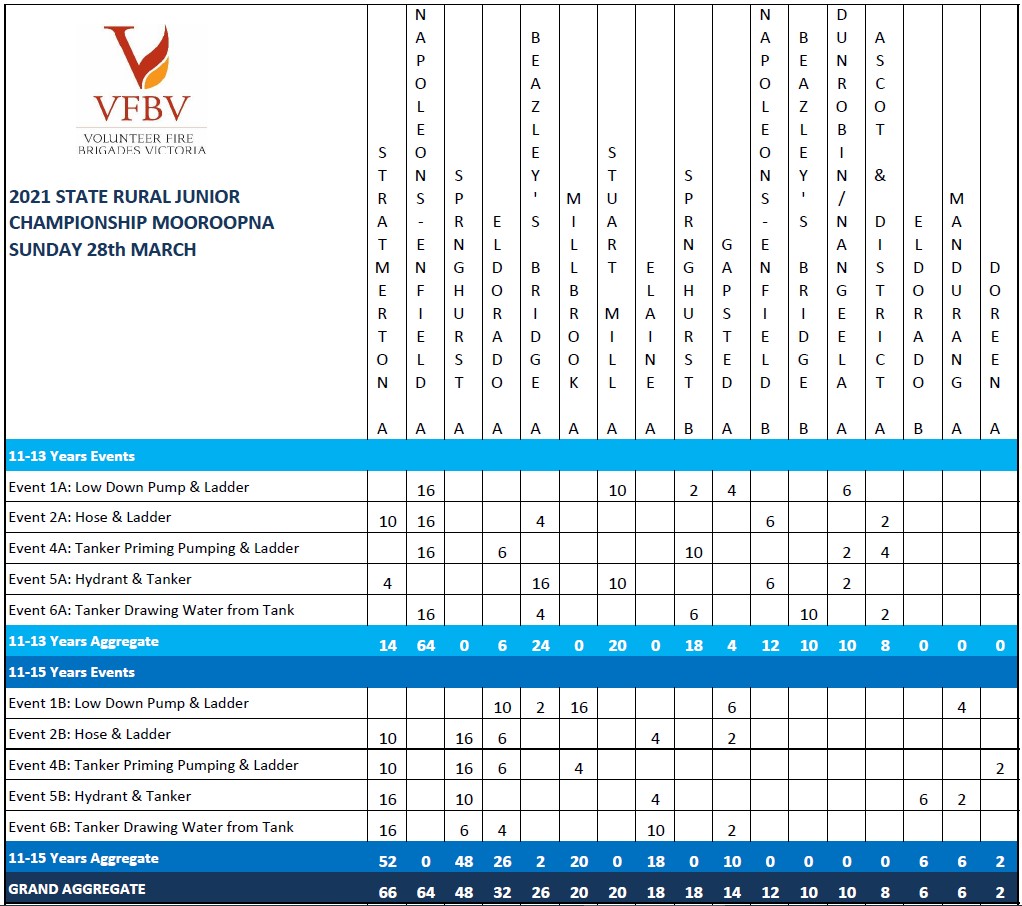
The place getters for each event and aggregate board are also available for download below.
 HomePage Featured
HomePage Featured



